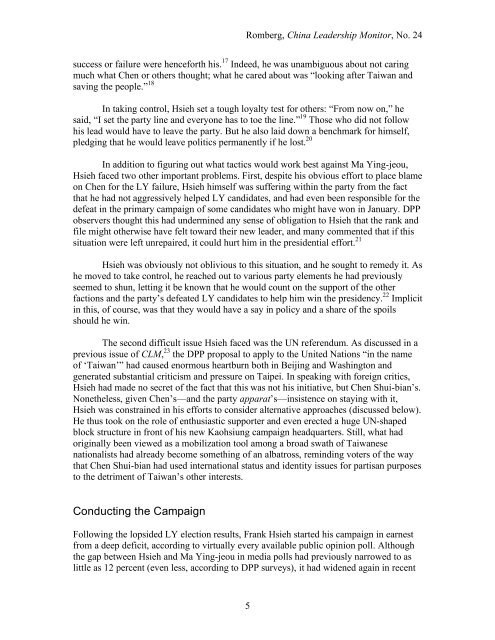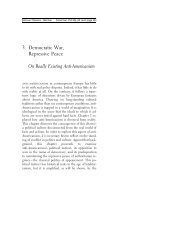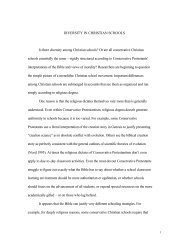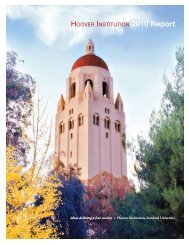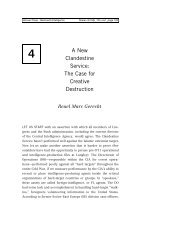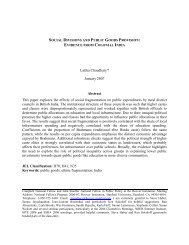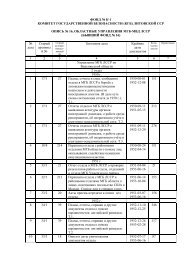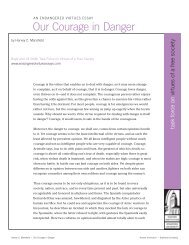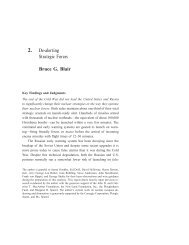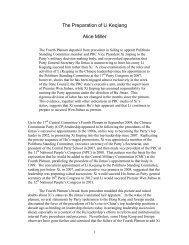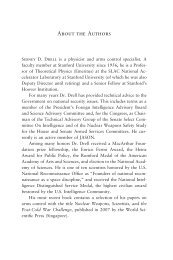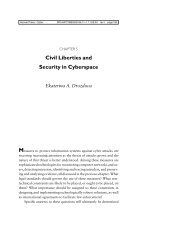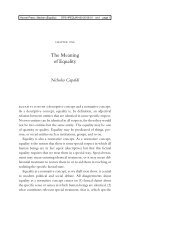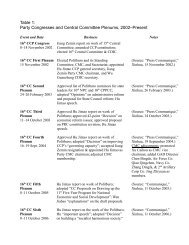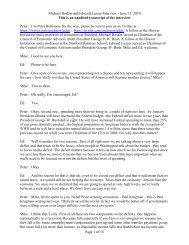Taiwan Elections: Foundation for the Future - Hoover Institution
Taiwan Elections: Foundation for the Future - Hoover Institution
Taiwan Elections: Foundation for the Future - Hoover Institution
You also want an ePaper? Increase the reach of your titles
YUMPU automatically turns print PDFs into web optimized ePapers that Google loves.
Romberg, China Leadership Monitor, No. 24<br />
success or failure were hence<strong>for</strong>th his. 17 Indeed, he was unambiguous about not caring<br />
much what Chen or o<strong>the</strong>rs thought; what he cared about was “looking after <strong>Taiwan</strong> and<br />
saving <strong>the</strong> people.” 18<br />
In taking control, Hsieh set a tough loyalty test <strong>for</strong> o<strong>the</strong>rs: “From now on,” he<br />
said, “I set <strong>the</strong> party line and everyone has to toe <strong>the</strong> line.” 19 Those who did not follow<br />
his lead would have to leave <strong>the</strong> party. But he also laid down a benchmark <strong>for</strong> himself,<br />
pledging that he would leave politics permanently if he lost. 20<br />
In addition to figuring out what tactics would work best against Ma Ying-jeou,<br />
Hsieh faced two o<strong>the</strong>r important problems. First, despite his obvious ef<strong>for</strong>t to place blame<br />
on Chen <strong>for</strong> <strong>the</strong> LY failure, Hsieh himself was suffering within <strong>the</strong> party from <strong>the</strong> fact<br />
that he had not aggressively helped LY candidates, and had even been responsible <strong>for</strong> <strong>the</strong><br />
defeat in <strong>the</strong> primary campaign of some candidates who might have won in January. DPP<br />
observers thought this had undermined any sense of obligation to Hsieh that <strong>the</strong> rank and<br />
file might o<strong>the</strong>rwise have felt toward <strong>the</strong>ir new leader, and many commented that if this<br />
situation were left unrepaired, it could hurt him in <strong>the</strong> presidential ef<strong>for</strong>t. 21<br />
Hsieh was obviously not oblivious to this situation, and he sought to remedy it. As<br />
he moved to take control, he reached out to various party elements he had previously<br />
seemed to shun, letting it be known that he would count on <strong>the</strong> support of <strong>the</strong> o<strong>the</strong>r<br />
factions and <strong>the</strong> party’s defeated LY candidates to help him win <strong>the</strong> presidency. 22 Implicit<br />
in this, of course, was that <strong>the</strong>y would have a say in policy and a share of <strong>the</strong> spoils<br />
should he win.<br />
The second difficult issue Hsieh faced was <strong>the</strong> UN referendum. As discussed in a<br />
previous issue of CLM, 23 <strong>the</strong> DPP proposal to apply to <strong>the</strong> United Nations “in <strong>the</strong> name<br />
of ‘<strong>Taiwan</strong>’” had caused enormous heartburn both in Beijing and Washington and<br />
generated substantial criticism and pressure on Taipei. In speaking with <strong>for</strong>eign critics,<br />
Hsieh had made no secret of <strong>the</strong> fact that this was not his initiative, but Chen Shui-bian’s.<br />
None<strong>the</strong>less, given Chen’s—and <strong>the</strong> party apparat’s—insistence on staying with it,<br />
Hsieh was constrained in his ef<strong>for</strong>ts to consider alternative approaches (discussed below).<br />
He thus took on <strong>the</strong> role of enthusiastic supporter and even erected a huge UN-shaped<br />
block structure in front of his new Kaohsiung campaign headquarters. Still, what had<br />
originally been viewed as a mobilization tool among a broad swath of <strong>Taiwan</strong>ese<br />
nationalists had already become something of an albatross, reminding voters of <strong>the</strong> way<br />
that Chen Shui-bian had used international status and identity issues <strong>for</strong> partisan purposes<br />
to <strong>the</strong> detriment of <strong>Taiwan</strong>’s o<strong>the</strong>r interests.<br />
Conducting <strong>the</strong> Campaign<br />
Following <strong>the</strong> lopsided LY election results, Frank Hsieh started his campaign in earnest<br />
from a deep deficit, according to virtually every available public opinion poll. Although<br />
<strong>the</strong> gap between Hsieh and Ma Ying-jeou in media polls had previously narrowed to as<br />
little as 12 percent (even less, according to DPP surveys), it had widened again in recent<br />
5


